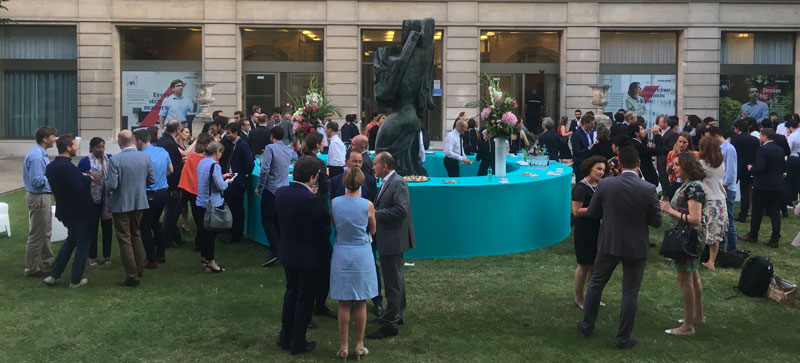Promoting research and innovation in humanitarian and social action – such is the mission of the French Red Cross Foundation. This mission requires the building of bridges between the academic community, civil society in France and abroad, aid workers, public institutions and private actors. Here is an overview of our partnerships, which make up both our capacity for action and our raison d’être.
Scientific partnerships at the heart of our mission
On November 14th and 15th, the French Red Cross Foundation held its yearly seminar in Yaoundé in Cameroon. As in previous years, several dozen speakers from the academic world and the humanitarian field, in Cameroon and elsewhere, took part in thematic round table discussions, bringing the principles of humanitarian transition face to face with local issues. As in previous years, none of this could have been possible without the support of our loyal partners, such as the IRD (Institut de recherche pour le développement) which contributed its local networks, specialist regional experts, and knowledge of the field, in order to organise the event.
More broadly, the Foundation’s entire capacity for action depends on its scientific partnerships. As a symbol of this openness to the academic community, the board of directors in charge of the selection of research projects includes no fewer than three scientific academic partners: the EHESS (Ecole des hautes études en sciences sociales), the EHESP (Ecole des hautes études en santé publique), and the IRD. The Foundation’s annual call for fellowships would not have the same impact without the involvement of these partners, or indeed, without the support of the AUF (Agence universitaire de la Francophonie), which guarantees its wide circulation in the 884 universities which it counts in 111 countries in every continent.
Finally, the mission of research, reflection and innovation which the Foundation has set for itself would have less meaning if it was not completed by the showcasing and dissemination of ideas and knowledge. In this, the Foundation is helped by major media partners such as Le Monde diplomatique and the Humanitarian Alternatives review, the first bilingual scientific review on humanitarian action.
Financial partners, the essential bedrock
If the scientific partners are the heart of the machine, the financial partners are the fuel for it. A number of loyal financial partners have supported our activity since the Red Cross Fund, the Foundation’s predecessor, was launched in 2013, including the Government of the Principality of Monaco, which commits each year for one or two studies pertaining to developments in international humanitarian aid, and the Crisis and Support Centre from the Ministry of Europe and Foreign Affairs.
But they are not only the fuel… The Foundation’s financial partners also show an increasingly better grasp of the need to understand our changing world. With ever more precise goals and higher expectations, new financial partners are calling upon the Foundation’s expertise for calls for projects, which are now co-developed according to their own interests. In this way, the Fondation Crédit Coopératif co-financed two research fellowships aiming to analyse how the social and solidarity economy could respond to the challenges posed by migration. This thematic approach was also followed by the AXA Research Fund, which drew on our expertise to better understand the concept of risk in developing countries, with research on themes including access to care, and the management of climatic and epidemic risks.

The International Red Cross and Red Crescent Movement
Like the financial partners, the 190 national societies which make up the International Red Cross and Red Crescent Movement need research in order to prepare for the crises to come, to understand those of the past, to call their certainties regarding social action into question, and to be actors of humanitarian transition. The Foundation has already carried out research on the difficulties encountered by the French Red Cross in Guinea during the Ebola epidemic. This year, the Volunteer and Engagement department of the French and Andorran Red Cross each financed a fellowship, respectively concerning the place of food aid in the migratory experience of new arrivals in mainland France, and first aid training. Representative of a first collaboration within the Movement, this research on first aid training involves three levels of actors: the International Federation of Red Cross Societies (by way of the World Reference Centre for First Aid), a national society (the Andorran Red Cross), and the Foundation.
Other members of the Movement will no doubt be next to associate themselves with our research work in order to shed light on humanitarian and social action, analyse suffering and means of responding to it, and thereby contribute to advancing practices.
Next, individual partners…
Because inventing future solidarity should concern everyone, the Foundation also appeals to individuals, not only as donors, but also as actors, and members of a community of support. The logic remains that of a partnership, with the expressed intention of associating donors with the Foundation’s activities, inviting them to participate in events which it organises, in order to meet, debate, share ideas, and perhaps sponsor a specific project.
Research should not be confined to a circle of experts. On the contrary, the efforts made to accompany solidarity actors and to create a more innovative, efficient and sustainable social and humanitarian action, must be made public and disseminated as widely as possible. The credibility of the actors and the confidence of the donors depends on it.





